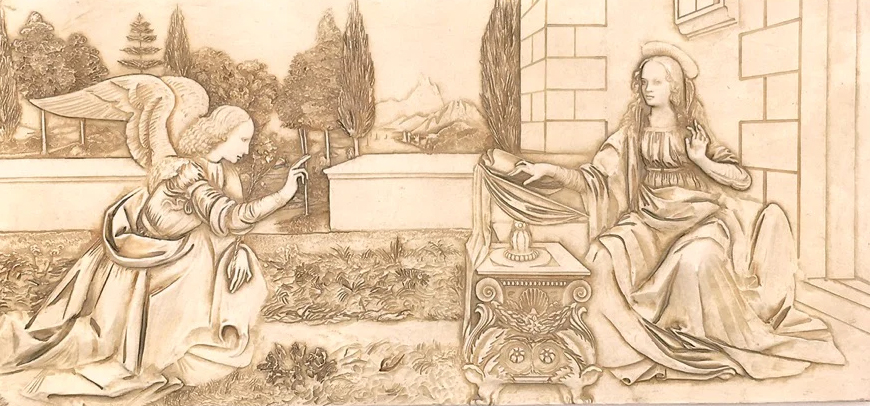We are all called to be mothers of God — for God is always waiting to be born.
— Meister Eckart, 13 c. German mystic
In the wake of the news that the U.S. Supreme Court has overturned Roe v. Wade, I am reminded of Luke 1:26-38 in which Mary learns she will be mother to Jesus. “The angel said to her, ‘Do not be afraid, Mary, for you have found favor with God. And now, you will conceive in your womb and bear a son, and you will name him Jesus. He will be great, and will be called the Son of the Most High, and the Lord God will give to him the throne of his ancestor David. He will reign over the house of Jacob forever, and of his kingdom there will be no end.’”

Julia Goldie Day
Mary, not understanding how she will become pregnant, bravely asks the angel how this can be. The angel explains that “nothing is impossible with God,” to which Mary replies, “Here am I, the servant of the Lord; let it be with me according to your word.”
Let it be.
Mary consents.
Mary says yes. She agrees to grow and nurture a child within her body and without.
Even God asks women for consent.
As Baptists, if we believe each person is autonomous and accountable to God and created in God’s own image, then we can believe God respects women so greatly that even God needed consent from Mary.
Then Mary sings praise to this God who asks for her consent in Luke 1:46-55.
In her song Mary magnifies the God of creation, the giver of life. She (like us) is blessed and called worthy, created in God’s own image, good and glorious. This God who creates us and loves us deeply is mighty, strong and fierce like the mother sheltering her children. This fierce strength scatters the proud and gives mercy to the weak. This God fills the hungry and has sent the rich away empty. This God lifts up the lowly and brings down the powerful.
Mary was not anyone important; she was one of the lowly. She was a woman in a patriarchal world with very few rights, especially as an ethnic minority (non-white Galilean Jewish) in a Roman-occupied country. She may have been fairly young, maybe even around the age of a teenager. It seems God is not concerned with her status or age, ability to follow the rules, race or gender, but with her heart.
Mary, the image bearer of Jesus Christ the Messiah, the Son of God, literally and freely, bears God.
“We can trust that God trusts women.”
Mary will turn our world upside down as we realize what Jesus has to teach us is a revolution of love, an upside down kin-dom where love, justice and freedom reign. Faithful living in love looks like Mary as she joins God in creating. She is the first to accept the message of Jesus and then sing it to the world.
Nancy Hastings Sehested paraphrases a portion of Mary’s song in this way:
I hope my baby knows a world full of God’s creating,
Where the high and mighty proud are put in their place —
their place right alongside all of us.
I hope my baby knows a world where tyrants and terrorists become harmless. And those whose lives never mattered all matter.
We can trust that God trusts women. We can trust that God expects each of us to make decisions with our bodies that are healthy and just. Mere justices or lawmakers do not have power over women’s bodies — for our bodies are sacred, a gift from God. If we consent, we chose to bear a child, then God rejoices. If we are unable to consent, if our answer is no or not right now, God also rejoices for God has given us wisdom and the power to make those choices.
All women and people who can be pregnant, like Mary, can be trusted to make these monumental decisions for ourselves and our families.
Likewise, we hope for all our children to know lives lived in peace and mercy. We hope our children will know a more just world where consent matters, for we are all “mothers of God.”
Julia Goldie Day is ordained through the Cooperative Baptist Fellowship and lives in Memphis, Tenn. She is a painter and proud mother to Jasper, Barak and Jillian.
Related articles:
Welcome to Gilead | Opinion by Susan Shaw
Why men should be concerned about the abortion ruling | Opinion by Darrell Hamilton III
Christianity: Where the end justifies the means | Opinion by Phillip Thomas


